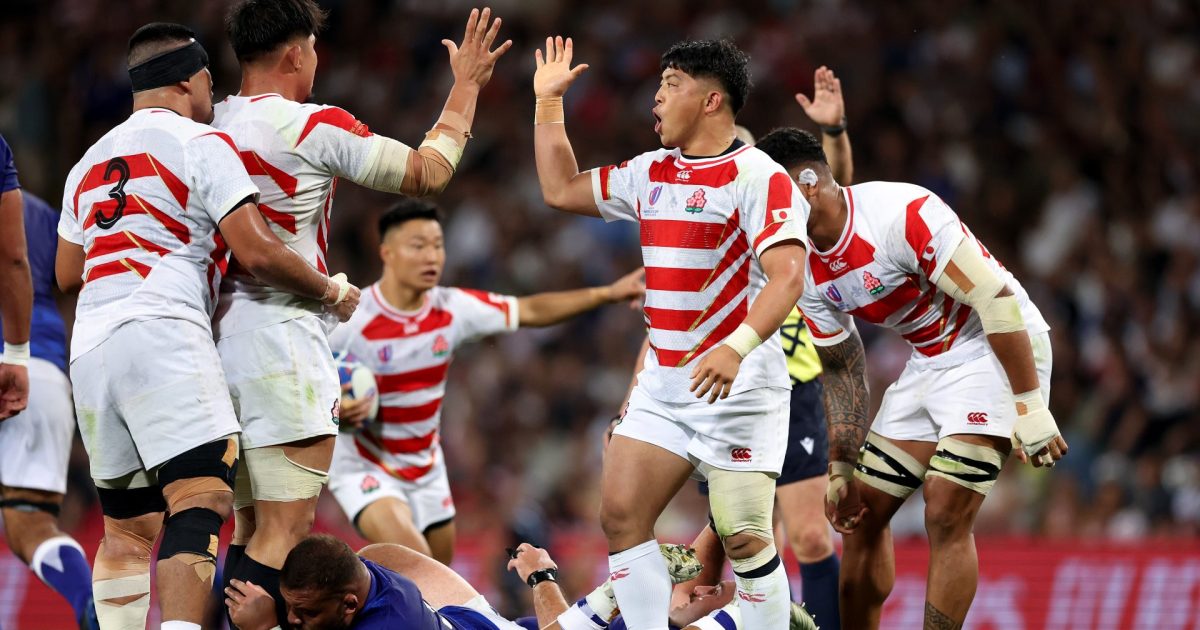Le Japon fait un bond vers les quarts en battant les Samoa

Le Japon est sorti de son duel face aux Samoa par une deuxième victoire à la Coupe du Monde de Rugby 2023 : 28-22 à Toulouse après avoir débuté par un 42-12 contre le Chili en ouverture de sa campagne. Un point commun avec les Samoa (victoire 43-10 contre los Cóndores) qui a enregistré sa deuxième défaite de rang après celle contre l’Argentine (19-10).
Le Japon garde vivant ses espoirs de se qualifier pour les quarts de finale tandis que les Samoa sont toujours en lice pour une qualification automatique pour la Coupe du Monde de Rugby 2027 en Australie.
Par sa vitesse d’exécution, le Japon a dominé le combat dans la première période, mettant du rythme pour surprendre la défense (quatre franchissements à deux) et aplatir deux fois grâce aux deux tauliers de la troisième ligne, Pieter Labuschagne (12e) et Michael Leitch (31e) ; Rikiya Matsuda ne manquant aucun des trois coups de pied qu’il a eu à tirer pour mener 17-8 à la pause. Malgré leur infériorité numérique (le talonneur Shota Horie exclu suite à un plaquage dangereux pour dix minutes à la 35e), les Brave Blossoms ont continué à construire pas à pas à l’image de cet essai collectif attribué à Himeno (48e).
La sourde indiscipline des Samoa
En face, malgré leurs intentions et leur réussite sur les phases statiques, les Samoa n’ont jamais pu prendre l’ascendant sur le Japon et ce n’était pas faute d’essayer : 77 ballons portés contre 34, 62% de possession et 58% d’occupation en première période. D’abord par un audacieux coup de pied de pénalité de D’Angelo Leuila dès la première minute à 59 mètres, certes centré, mais qui passait juste en dessous de la transversale. Ou encore cette passe à l’aveugle bien sentie du demi de mêlée Jonathan Taumateine au sortir de la mêlée mais qui ne trouvait personne.
Il n’y a bien que leur puissance qui leur permettait le meilleur avec cet essai du talonneur Seilala Lam après un ballon porté à la 37e , celui de l’arrière Duncan Paia’aua (64e) après un festival de raffuts et percussions ou tout en force de Christian Leali’ifano (77e). Ce dernier essai donnera un bonus défensif de consolation (28-22).
Mais leur puissance était aussi leur principale source d’ennuis. Ainsi, deux cartons sont tombés pour déblayage non autorisé (Taumateine à la 31e) et plaquage dangereux (Ben Lam, 46e). Ce dernier verra son jaune commué en rouge. Cette indiscipline reste un mal profond des Samoans qui en sont maintenant à onze cartons jaunes au cours de leurs sept derniers matchs de Coupe du Monde de Rugby.
La domination japonaise consolidée
Pour cette 18e confrontation entre les deux équipes, la domination japonaise n’est que récente puisque quatre de ses six victoires à ce jour ont eu lieu lors des cinq dernières rencontres (alors qu’entre 1990 et 2012, les Japonais n’ont remporté que deux de leurs 13 duels).
Il ne reste plus qu’un match à disputer pour les deux équipes. Le Japon jouera contre l’Argentine le dimanche 8 octobre à Nantes tandis que les Samoa rencontreront l’Angleterre la veille à Lille.






